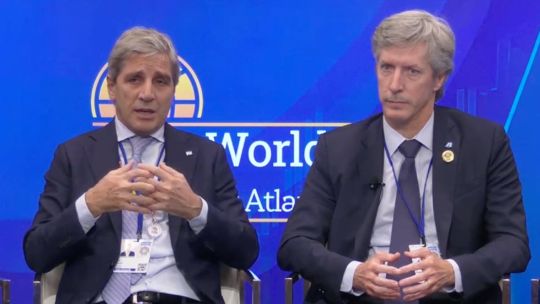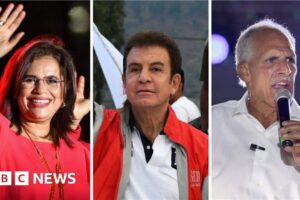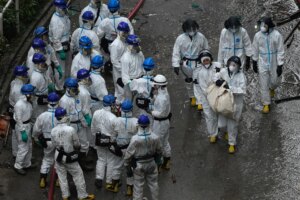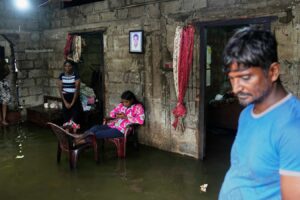
President Javier Milei’s top economic officials said Wednesday they hope Argentina’s US$20-billion currency swap with the United States will be finalised within two weeks.
Speaking at an event in Washington, Economy Minister Luis Caputo and Central Bank Governor Santiago Bausili voiced optimism about Argentina’s prospects and highlighted the strong backing it has received from the Trump administration in recent days.
“Hopefully very soon we will be able to execute the framework agreement for the swap,” Caputo told an audience at the Adrienne Arsht Latin America Center of the Atlantic Council.
Bausili confirmed that Argentina and the US Treasury had reached a conceptual framework for the US$20-billion facility, a move designed to bolster liquidity and confidence given heightened market volatility ahead of the October 26 midterm elections.
The Milei administration is hopeful of finalising the agreement before the elections take place, said Bausili.
Earlier in the day, Treasury Secretary Scott Bessent told Axios that Argentina could receive up to US$40 billion if a “facility” with private-sector support is activated. He said the plan would be “adjacent” to the US government swap line, with interest from banks and sovereign wealth funds.
“The US government is ready and prepared to work on many different fronts,” Caputo said. The currency swap will help Argentina maintain a tight monetary stance, leaving “no doubt that we can deal with this,” he added.
The remarks came a day after Milei and senior Argentine officials met with US President Donald Trump and Bessent at the White House.
Washington reaffirmed its political and financial support for Milei’s market-oriented reform programme. Talks are ongoing over additional support measures.
Exchange rate policy
Caputo and Bausili, former colleagues at JP Morgan and Deutsche Bank, were asked about further US support and Washington’s stance on Argentina’s ties with China.
Market interventions, additional peso purchases and talks on a bilateral trade deal are all under discussion, though Caputo said he could not yet disclose details.
“I don’t think the swap with the US will be the only tool; it will depend on the analysis and economic conditions,” Bausili said.
Asked whether conditions were attached to the swap, Bausili did not answer directly, , referring to previous comments from Bessent that Washington is not concerned about Argentina’s existing US$18-billion currency swap with the Chinese central bank.
Bausili also defended Argentina’s exchange-rate band, introduced in April to manage peso volatility during the transition toward a freer float. Some economists have urged speeding up that process after the elections.
“In April we moved away from a crawling peg to a wider band that allows the market to operate freely, while containing excessive swings,” said the Central Bank chief. “Given the political noise, we see no reason to recalibrate the regime. It remains consistent and well-calibrated.”
Both officials acknowledged that Argentine markets and assets were under pre-election market stress, but noted similar pressures before elections in 2019 and 2023. Bausili, however, argued that recent financial tensions were a result of political uncertainty rather than economic weakness.
“We have an economy built on iron fundamentals,” he said. “Fiscal policy is on track, the Central Bank’s balance sheet has been repaired and inflation is steadily coming down.”
Caputo downplayed fears that reforms could stall if the ruling Libertad Avanza party loses the midterms. “These elections are important, but not decisive for our economic strategy,” he said. “Our commitment to fiscal discipline, monetary prudence and reform will not change, regardless of the outcome.”
Fiscal discipline and structural reform
Caputo noted that Argentina posted its first fiscal surplus in more than a century after running deficits in 124 of the past 130 years.
“We reached fiscal equilibrium by cutting government spending by 15 percent,” he said. “For 20 months we’ve maintained a primary surplus. That is the foundation of stability.”
The economy minister warned that Argentina must avoid the “political volatility” that has long deterred investors. Stability and policy continuity, he said, are essential to rebuild confidence and attract foreign direct investment.
Caputo highlighted an unprecedented surge in foreign investment commitments, stating that Argentina had secured roughly US$100 billion in funding for new projects across various sectors, including energy, mining, and technology.
“The level of investor interest we’re seeing is remarkable. We’ve approved a new regime for large investments over US$200 million [Milei’s ‘RIGI’ scheme], and already have around US$80 billion in announced or ongoing projects,” he said.
“For decades, Argentina relied on agriculture for its foreign currency,” Caputo continued. “Within four years, the surplus from mining and energy will double that of agriculture. That’s a structural transformation.”
Both officials framed Argentina’s transformation as a long-term project to make it the “the freest and fastest-growing” country “in the next 20 years,” with policies geared towards private-sector investment, deregulation and international integration.
Caputo closed by thanking US officials for their “professionalism and commitment,” calling the talks a turning point in bilateral ties.
“The US is our most powerful ally,” he said. “This is a historic opportunity – and we are not going to waste it.”
related news





